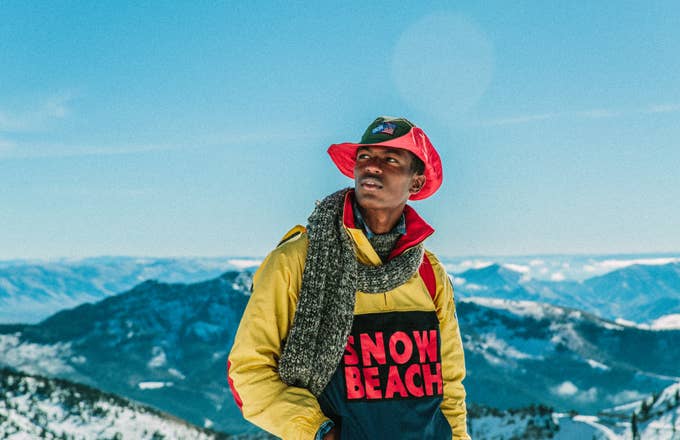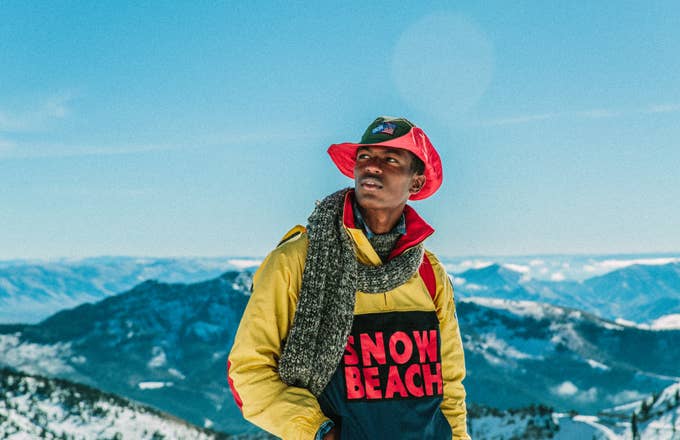
During the late ‘80s, the Lo-Lifes—a group made up of mostly minority teens from Brooklyn—wore Polo Ralph Lauren like uniforms. It was common to see them rolling 20 deep to clubs in head-to-toe in gear reserved for avid skiers or rugged outdoorsmen, and the rappers who either frequented those same clubs, or were from the same neighborhoods, emulated their style and took the way kids wore Polo in the ‘hood mainstream. The types of clothing rappers were wearing then trickled back down to the fans that weren’t from these same pockets of the country. The circle of life. Polo Ralph Lauren has remained a staple for generations of rap fans and in turn it has benefited from rappers and inner cities buying its clothes. If you search the word “polo” on Genius.com, the shout outs are endless. It’s mentioned in song titles, lyrics, album names and covers. Hip-hop culture has served as a marketing tool for the brand for years.
By the early to mid ‘90s, Polo had become the go-to for rappers of the era. Grand Puba performed “What’s the 411?” with Mary J. Blige on Yo! MTV Raps in an Alpine rugby, the group Zhigge was one of the first to wear the brand in their video for “Toss It Up,” and of course, Raekwon famously wore a yellow, blue, and red pullover jacket with big, bold red letters that read “Snow Beach” across the front panel in the “Can It All Be So Simple” video. Already a sought-after piece in the streets of NYC, the Snow Beach jacket became a national phenomenon with young rap fans after that video. At the time, Wu-Tang was the best thing smoking and people were copying every move they made, from music to style. “Pop-culture wise, hip-hop has done a lot of the heavy lifting for Polo over the last 25 years,” says internet personality and avid Polo collector Dallas Penn. Still, the brand has never publicly given rap its props for its influence and impact.
Recently, Polo re-released its ’92 Stadium series and dropped its ‘93 Snowboarding collection (which includes the Snow Beach pullover, a red Snow Beach vest, a Snow Beach bucket hat, and a Cold Wave fitted cap along with newer pieces in black and white like a couple Snow Beach rugbys, poncho, backpack, waist pack, and sneakers) at midnight today for their 25-year anniversaries, respectively—two lines made popular by rappers and rap fans alike. Is Polo finally acknowledging hip-hop or is the brand just trying to cash in on the retro craze Nike made popular?
In the last year or so, Polo has faced financial troubles and has been forced to close down several of its brick and mortars. In 2016, the company shut down 50 stores and cut 1,000 employees from its workforce, according to Fast Company. In February 2017, CNN reported that Polo’s sales continued to fall, and that its stocks had plunged nearly 12 percent in early trading news. Then, in April of the same year, it was announced that Polo was closing its Fifth Avenue flagship store in New York. So a re-release of two of the brand’s most iconic collections could certainly be the shot in the arm the company needs, right?
The re-launch of the 1992 Stadium series this past September caused a bit of hysteria among streetwear enthusiasts and resellers alike. People lined up overnight the way they would for a pair of Jordans or any Supreme release. In fact, the demand was so high that some pieces are now being resold on on eBay for double or triple the retail price.
“Pop-culture wise, hip-hop has done a lot of the heavy lifting for Polo over the last 25 years,” says internet personality and avid Polo collector Dallas Penn.
But Penn doesn’t think the re-launches are a “money grab” per se. “[Ralph] realized, from [seeing] other brands, that he was leaving a lot of money on the table,” he states, “but it wouldn’t make sense if Polo was doing this to get their bottom-line up because they didn’t make enough items. And he’s not making money off of the resale.”
According to Penn, who says he’s hyped for the new Snow Beach collection, the re-release is an indirect acknowledgement from Polo—much like the signing of Tyson Beckford back in 1993. Beckford, then a 23-year-old black model from the Bronx, became the face of Polo Sport and was a far cry from the white, preppy models the brand had primarily been using. Many, including Penn, saw it as the company’s way of tipping its cap to the ‘hood. There was something powerful in seeing someone that looked like you and your friends in a national campaign like Polo Sport.
Polo’s recognition of hip-hop wasn’t as straightforward as Tommy Hilfiger’s, who seeded rappers and singers with garments, most notably Aaliyah, who herself appeared in a Tommy commercial. But maybe the label didn’t necessarily have to. The decision to remain neutral and not pander to hip-hop has kept it more relevant than Tommy over the years.
It’s hard to pinpoint exactly why Polo decided to bring back both the Snow Beach and ‘92 Stadium collections. Polo declined to comment for this piece and would only speak on background, but according to a representative for the brand, the company re-released the original Snow Beach collection because it’s been deeply embraced by streetwear collectors. They also wanted the re-launch to be authentic and to create product and imagery that connected with ‘Lo heads today. Still, there’s no denying that the brand is aware of the Lo-Lifes and the impact hip-hop has had on its brand. Tom Gould, who co-published the book Bury Me With the Lo On with Lo-Life founder Thirstin Howl III, shot the new Snow Beach campaigns for Polo. Earlier today Just Blaze posted on Instagram that he and Raekwon surprised everyone waiting on line at Polo's NYC Prince Street store. According to Raekwon's manager, Polo reached out to Just Blaze, who insisted Raekwon be there.
Hip-hop doesn’t need Ralph Lauren. Hip-hop has never needed anybody or any brand for anything. Would Polo openly acknowledging hip-hop be cool? Sure. But the company runs the risk of being viewed as corny panderers, and nobody likes to be pandered to. As of right now, Polo Ralph Lauren is still the benchmark when it comes to American fashion, and has never stolen a hip-hop aesthetic and trotted it out as if it were its own idea. Polo and hip-hop fit naturally like a handshake. Turning its nose up and pretending we haven’t helped the brand in terms of visibility and free marketing makes us covet Polo even more; it’s a genius move on the brand’s part.
Still, an ad campaign with Raekwon rocking the Snow Beach on a wintery mountain would’ve been incredible and extremely important to Polo/rap relations. “They shoulda called me,” Raekwon recently told Complex. “I felt a little bit insulted that I didn’t get a personal call. But, like I said, I want to talk to Ralph Lauren personally and tell him, ‘Yo, you know the boy who did those for you. Just call me. Say, ‘What up?’” And he’s right.
You can see Raekwon, 2 Chainz, Young Dro, Just Blaze, Tyson Beckford, the Lo-Lifes, and many more talk about their love and appreciation for Polo Ralph Lauren, and how hip-hop impacted the brand when we release our documentary Horse Power on Tuesday, Feb. 13, 2017. Check out the trailer here.


